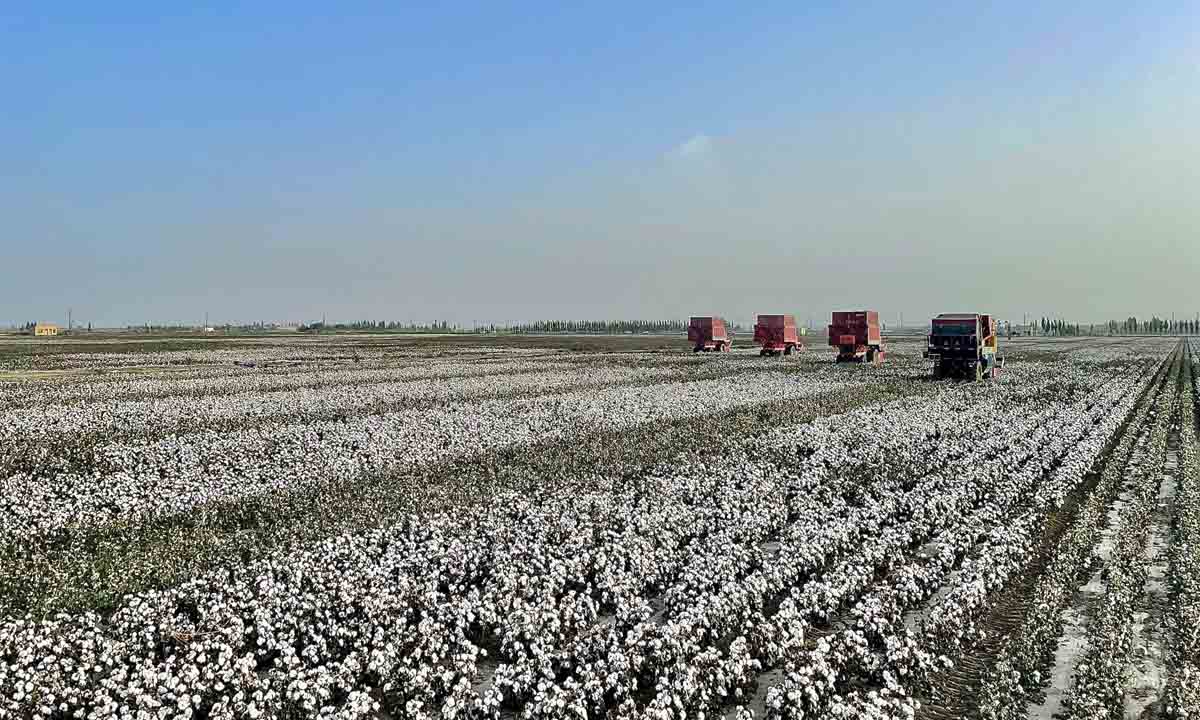‘Mind your own forced labor problem’: Xinjiang regional govt refutes US Uygur bill

A domestically-developed automatic cotton-picking machine fleet at work in Shaya county, Aksu Region, Northwest China’s Xinjiang Uygur autonomous region. Photo: Lin Luwen/GT
China's Xinjiang regional government on Saturday called the US signing of the so-called Uygur forced labor prevention act as an open interference in China's internal affairs with a purpose to contain China. The regional government also said it shows the US bullying logic and revival of a Cold War mentality.
Xu Guixiang, the Xinjiang regional government spokesperson, made the remarks at a press conference held on Saturday in Beijing, which came closely after US President Joe Biden signed a legislation which bans products made in China's Xinjiang, citing "oppression" of the Uygurs and other minorities.
On Friday, the Foreign Affairs Committee of the National People's Congress also said that China will take firm and strong countermeasures if the US insists on acting arbitrarily.
Xu told the media that the US bill seriously distorted the actual situation in Xinjiang. The region has been earnestly implementing relevant laws in the region and strictly forbid any forced labor.
Xinjiang upholds the concept of enabling the people to lead a better life, and earnestly respects and protects the legitimate rights and interests of the people of all ethnic groups in Xinjiang. Xinjiang firmly opposes any form of ethnic discrimination and strictly prohibits any form of forced labor, ensuring that people of all ethnic groups work decently, the spokesperson said.

Farmers pick megranates in Pishan County of Hotan, northwest China's Xinjiang Uygur Autonomous Region, Oct. 8, 2020. Photo: Xinhua
The so-called Uygur forced labor prevention act seriously violated the international laws and norms of international relations. Based on Forced Labour Convention, Xinjiang does not have the "forced labor" problem. This is a typical "long-arm jurisdiction". Their devil's claws stretched too long and has gone beyond the scope of the law to become a kind of political manipulation and a parody, Xu added.
According to Xu, since the end of 2018, the region has received visits by official delegation from the UN, envoys from Africa, Latin America and Arab States as well as foreign religious organizations, scholars and internet influencers from more than 100 countries and regions. They have seen the labor situation in Xinjiang with their own eyes, and they spoke highly of the regional labor policy.
The US is pointing fingers at Xinjiang labor affairs based on false information, rumor and lies, using holding ideological bias, which is unjust and irresponsible, Xu criticized.
In fact, the US itself has the centuries of histories of trafficking, abusing and discrimination against slaves, the Xinjiang official pointed out.
Xu listed at the Saturday event that from receiving the first batch of slaves in 1619 to 1865, the southern plantations of the American continent became the main place where blacks and other minorities became forced labor. In order to ensure a sufficient labor force, even during the prohibition of the international slave trade from 1783 to 1808, American traders still used various means to transport about 170,000 slaves to the US. This figure was one third of the total number of slaves imported to North America since 1619.
"It can be said that forced labor is a stain that will never be erased from the American history. The US, which started from the bloody slave trade, is still a country of modern slavery, and the issue of forced labor in the US cannot be denied, " Xu said.
Xu concluded that the so-called US Uygur bill will not affect the development of Xinjiang, but it just exposes the US' malicious intent of using fake human rights to secure true hegemony.
The US might as well mind its domestic forced labor problems and formulate a Native American forced labor prevention act, as the American history is filled with the expulsion, slaughtering and forced assimilation of the Native American people, who have become a "disappearing ethnicity," Xu noted, while urging the US to reflect on its own problems.
Photos
Related Stories
- U.S. must revoke all sanctions on Xinjiang textiles: commerce chamber
- Xinjiang's first desert-crossing expressway opens to traffic
- Cancelled flights put damper on U.S. holiday travel: media
- U.S. signing of Xinjiang-related act "wrong, unpopular, dangerous": spokesperson
- U.S., China should compete in "racing match," not "boxing match": Chinese ambassador
Copyright © 2021 People's Daily Online. All Rights Reserved.










